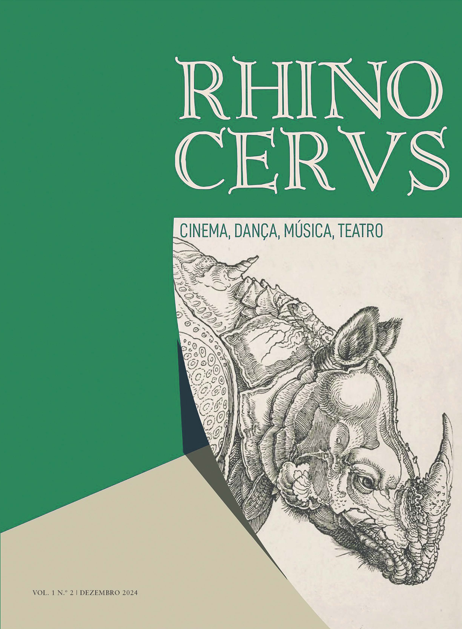Nothing From Nothing
DOI:
https://doi.org/10.34629/rcdmt.vol.1.n.2.pp114-162Keywords:
King Lear, The aesthetics of nothing, Shakespeare’s tenth muse, Sebastianism, Cordelia’s doubleAbstract
This paper discusses the theory and inspiration behind producing, directing and editing a film adaptation of Shakespeare’s King Lear entitled Nothing From Nothing (2024/2025). The goal is to highlight the aesthetic value of nothing by exposing nothing’s miraculous ability and power to create itself out of itself, and to inspire autonomous creativity in others.
Downloads
References
Cornford, Francis M. 1939. Plato and Parmenides: Parmenides’ Way of Truth and Plato’s Parmenides. Translation and introduction by Francis M. Cornford. London: K. Paul, Trench, Trubner & Co.
Drayton, Michael, Bartholomew Griffin, and William Smith. 1897. Elizabethan Sonnet-Cycles. Vol. 3. Edited by Martha Foote Crow. London: Kegan Paul, Trench, Trübner and Co.
Dryden, John. Don Sebastian, King of Portugal a Tragedy, Acted at the Theatre Royal / written by Mr. Dryden. In the digital collection Early English Books Online. https://name.umdl.umich.edu/A69868.0001.001. University of Michigan Library Digital Collections. Accessed December 18, 2023.
Oliveira, Manoel de. 1990. Non Ou a Vã Glória de Mandar. Lisboa: Lusomundo Audiovisuais.
Pessoa, Fernando. 1988. Texto Crítico das Odes de Fernando Pessoa – Ricardo Reis. Tradição Impressa Revista e Inéditos de Silva Belkior. Lisboa: INCM.
Pessoa, Fernando. 2000a. Crítica: Ensaios, Artigos e Entrevistas. Edição de Fernando Cabral Martins. Lisboa: Assírio & Alvim.
Pessoa, Fernando. 2000b. Message. Translated by Martin Earl. Introduction, textual addition and notes by António Apolinário Lourenço. Lisbon: Lisbon Poets & Co.
Pessoa, Fernando. 2000c. Poesia Inglesa I. Edição e tradução de Luísa Freire. Lisboa: Assírio & Alvim.
Pessoa, Fernando. 2008. Forever Someone Else: Selected Poems. Translated by Richard Zenith. 3rd ed. Lisboa: Assírio & Alvim.
Pessoa, Fernando, et al. 2018. Orpheu: Revista Trimestral de Literatura. Volume I (2 and 3). Facsimile Edition. Lisbon: Imense, Lda.
Pessoa, Fernando, et al. 2022. The Seafarer by Fernando Pessoa. Orpheu: Literary Quarterly Volumes 1 & 2 (1915). Translated by David Swartz. New York: New Meridian Arts.
Seton, James Lockwood. 1877. The Select Dramatic Works of John Dryden. London: Hamilton, Adams, & Co. Glasgow: Thomas D. Morison.
Shakespeare, William. 2020. Complete Works. Arden Shakespeare Third Series. 1st ed. New York: Bloomsbury Publishing.
Swartz, David. 2021. The Seafarer by Fernando Pessoa. Lisbon: David Swartz. https://vimeo.com/795369509/8817d67e6d.
Swartz, David. 2024/25. Nothing From Nothing. Lisbon: David Swartz.
Downloads
Published
Issue
Section
License
Copyright (c) 2024 RHINOCERVS: Cinema, Dança, Música, Teatro

This work is licensed under a Creative Commons Attribution-NonCommercial 4.0 International License.
Articles published or submitted to RHINOCERVS: Cinema, Dança, Música, Teatro are licensed according to Creative Commons Attribution License (CC BY-NC 4.0). Authors agree that:
Copyrights of all articles published are retained by authors with first publication copyright granted to the journal.
All articles are under the Creative Commons Attribution License recognizing the authorship of the publication and identifying that first publication took place in this journal.
Authors have the right to free distribute or make available in private or institutional pages the version published by RHINOCERVS: Cinema, Dança, Música, Teatro provided the original proper citation.
The journal only accepts articles not published previously (except in the form of an abstract or as part of academic thesis), that it is not under consideration for publication elsewhere. After published, the article cannot be published again partial or totally without the editorial board consent.





